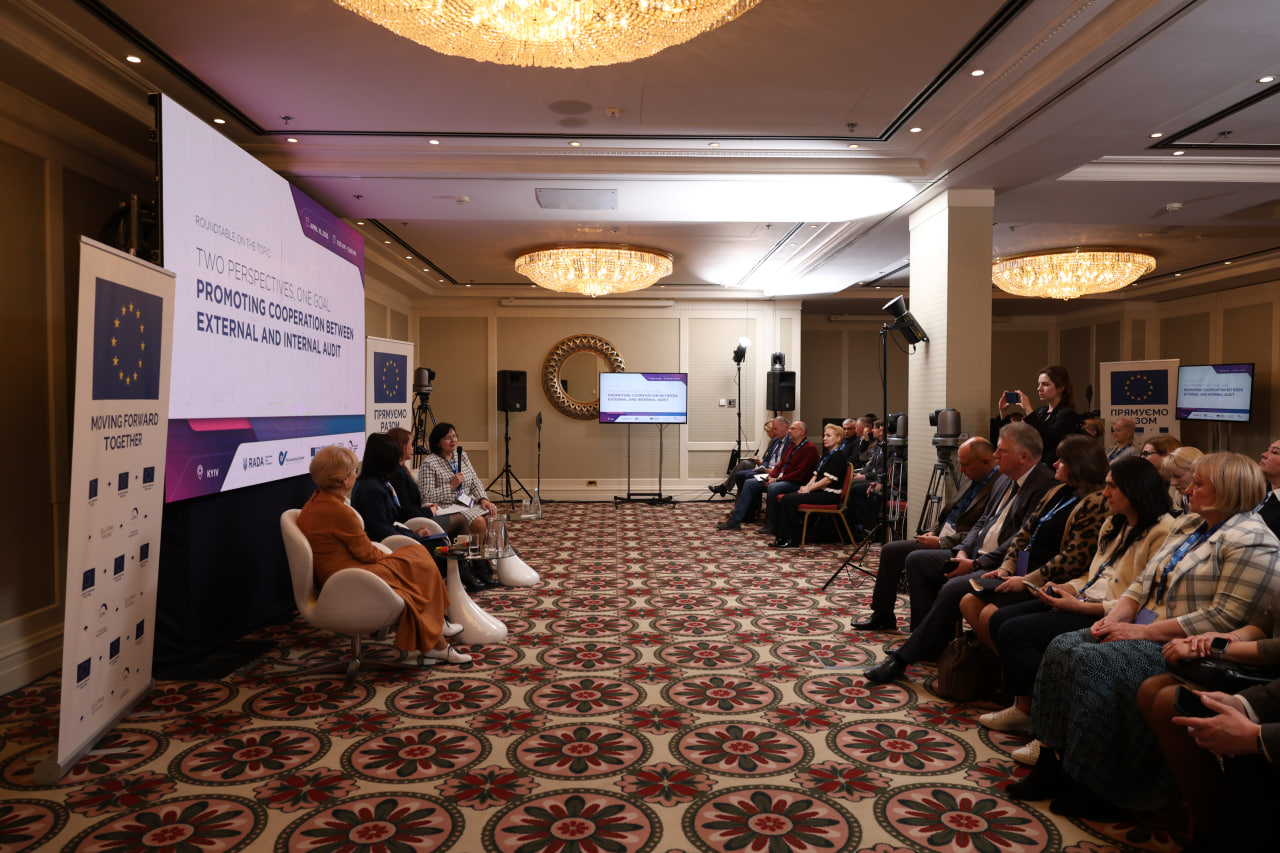EU4PFM продовжує сприяти діалогу між зовнішніми та внутрішніми аудиторами в Україні
Київ, 16 квітня 2025 року — EU4PFM провів восьмий високорівневий семінар із серії заходів «Дві точки зору, одна мета: сприяння співпраці зовнішнього та внутрішнього аудиту».
Захід, що став вже традиційним, відбувається на регулярній основі та спрямований на поглиблення співпраці між зовнішніми та внутрішніми аудиторами України шляхом діалогу, обміну досвідом та гармонізації з найкращими практиками ЄС.
Учасниками семінару стали представники Секретаріату Комітету Верховної Ради з питань бюджету, Рахункової палати України, Державної аудиторської служби, внутрішніх аудиторських підрозділів державних органів, а також міжнародні експерти з Іспанії та Латвії. Програма заходу включала змістовні доповіді, практичні кейси та інтерактивні дискусії.
У вступному слові Інгуна Судраба, керівниця Компонента 5 EU4PFM «Зовнішній аудит та парламентський контроль», наголосила на стратегічному значенні тісної взаємодії між аудиторами:
«Налагодження співпраці між внутрішніми та зовнішніми структурами аудиту є ключовим для підвищення якості аудиту, уникнення дублювання та ефективного використання державних ресурсів. Через подібні ініціативи EU4PFM допомагає Україні посилювати довіру до інституцій та впроваджувати європейські стандарти аудиту», — зазначила Інгуна Судраба.
До вітальних звернень також долучилися Голова Рахункової палати Ольга Піщанська, директорка Департаменту нормативно-методологічного забезпечення Держаудитслужби Ольга Кучма та Марина Бариніна, керівниця сектору внутрішнього аудиту Національного агентства з питань запобігання корупції. Вони підкреслили зусилля України, спрямовані на зміцнення системи внутрішнього та зовнішнього фінансового контролю, а також підвищення прозорості та підзвітності у сфері публічних фінансів.
Однією з ключових подій семінару стала доповідь Соледад Льямас Татор, голови Комітету з питань співпраці між ECIIA та EUROSAI та директорки внутрішнього аудиту в Canal Isabel II (Мадрид). Вона представила результати міжнародного опитування, яке охопило 134 респонденти з 24 країн, і поділилася висновками щодо стану співпраці аудиторських структур у Європі:
«У 86% Вищих органів фінансового контролю в Європі існує певна форма координації з внутрішніми аудиторами, однак лише 42% офіційно використовують результати їхньої роботи у власних перевірках. Це свідчить про значний невикористаний потенціал», — зазначила Соледад Льямас Татор.
«До того ж, ми бачимо такі виклики, як відмінності у професійних стандартах, ризики неправильного трактування результатів, нестачу структурованої комунікації. Але гарна новина полягає в тому, що ми знаємо, як із цим працювати — завдяки чіткій комунікації, спільному плануванню та взаємному визнанню ролей. Як ми кажемо: дві ролі — один танець»
Вона також описала форми співпраці, які спостерігаються у різних країнах: обмін документами, спільні тренінги, регулярні зустрічі та навіть співавторські публікації. Згідно з опитуванням, установи, які перевіряються , частіше залучають внутрішній аудит і активно обмінюються інформацією — що ще раз підкреслює важливість інституціоналізованої співпраці.
Її виступ доповнила Інгріда Кальніня-Юнга, керівниця аудиторського сектору Державної аудиторської служби Латвії, яка поділилася власним досвідом:
«Ефективна взаємодія між вищими органами фінансового контролю і внутрішніми аудиторами є критично важливою для підвищення якості управління та аудиту. Поєднання зовнішньої незалежності з внутрішньою обізнаністю дозволяє нам краще оцінювати ризики, вчасно виявляти проблеми та узгоджувати дії з нормативними вимогами. Незважаючи на виклики — зокрема, уніфікацію підходів і формування довіри — переваги такої співпраці очевидні: від більш ефективного використання ресурсів до зміцнення довіри громадян до органів влади», — наголосила Інгріда Кальніня-Юнга.
У рамках заходу також були представлені українські напрацювання — зокрема, результати опитування серед аудиторів Рахункової палати щодо їхньої взаємодії з підрозділами внутрішнього аудиту.
Семінар завершився жвавою панельною дискусією, під час якої обговорювалися бар’єри та можливості для подальшої координації дій аудиторів.
Цей семінар є частиною ширшої підтримки проєкту EU4PFM, спрямованої на вдосконалення системи управління публічними фінансами України та формування професійного, незалежного та ефективного середовища аудиту відповідно до стандартів ЄС.
